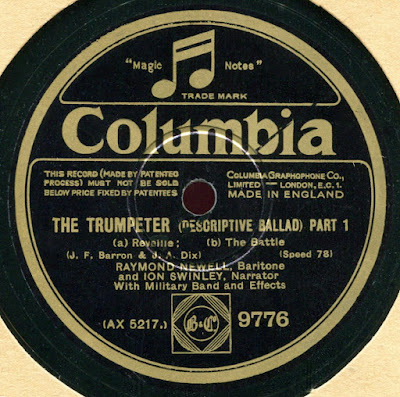Some great country gospel from the late 1920s, a 1912 recording of Will the Circle Be Unbroken by the Scottish gospel singer William MacEwan, and so much more in today's--er, tonight's--Sunday gospel playlist.
Our opening track--The Deal Family's Be a Daniel, from 1927--is one I'll definitely have to research, because it's not the famous Philip P. Bliss song but another tune and text entirely. Maybe I have it someplace in my 5,000 hymnals. (Okay--300.) A total mystery. And I love this style of family gospel harmonizing. Believe it or not, this sort of singing continued into the 1970s, and maybe beyond.
William MacEwan's Will the Circle Be Unbroken (he's "William McEwan" on my American Columbia issues) appears to be the first-ever recording of this great Charles H. Gabriel gospel number, written in 1907. A quite popular Scottish gospel singer, MacEwan sang in a style that can only be described as... let's say, the opposite of the Carter Family approach. William sang with much passion and verve, not to mention enough vibrato for any four vocalists. I love his over the top approach, though, judging from comments received at earlier MacEwan posts, not everyone may agree.
Onward, Christian Soldiers features a text by Sabine Baring-Gould (1865) and music by Arthur Sullivan (of Gilbert and Sullivan fame, 1871). You may have heard this one before, someplace.
As for the Gid Tanner two-fer, Don't You Hear Jerusalem Moan and Alabama Jubilee, these two sort of go together, even if Jubilee is hardly known as a religious number. Jerusalem--a bluegrass standard, but, as far as I know, originally a black spiritual--makes fun of Christian hypocrites (at least in the African-American text), while Jubilee makes fun of black religious (?) gatherings, and in the racist fashion we'd expect from a 1915 hit. One's the real thing, and the other is a play on the real thing; over time, the two tend to mix in historical memory. If my copy sounds pretty beat, it's because it is.
And here's a lengthy Wikipedia entry on Phillips Lord, whose 78s sound like those of a radio personality, most likely because he was one. In some ways, he was the Garrison Keillor of his day. "Fake home-spun" we could call his genre. I could, anyway. And I have a theory that family radio dramas evolved from stage presentations, because, after all, radio in its early days incorporated all types of contemporary entertainment forms (just as TV did in the late 1940s).
And I know nothing about the Bush Brothers, except that they made interesting gospel sides.
Click here to hear: When the Gates of Glory Open
PLAYLIST
Be a Daniel--The Deal Family, 1927.
Working and Singing--The Deal Family, 1927.
Will the Circle Be Unbroken (Habershon-Gabriel)--William MacEwan, 1912.
Onward, Christian Soldiers (Baring-Gould-Sullivan)--Victor Mixed Chorus, with Orch., 1928.
Don't You Hear Jerusalem Moan--Gid Tanner & His Skillet-Lickers, w. Riley Puckett, 1926.
Alabama Jubilee (Cobb-Yellen)--Same, 1926.
Sunday Evening at Seth Parker's--Gathering with the Lord Today--Phillips Lord and Co, 1929.
Sunday Evening at Seth Parker's--Jesus Is My Neighbor--Same, 1929.
On the Glory Road--Bush Brothers, 1928.
When the Gates of Glory Open--Same, 1928.
Ripped from 78s in my collection with MAGIX Audio Cleaning Lab MX.
Lee






